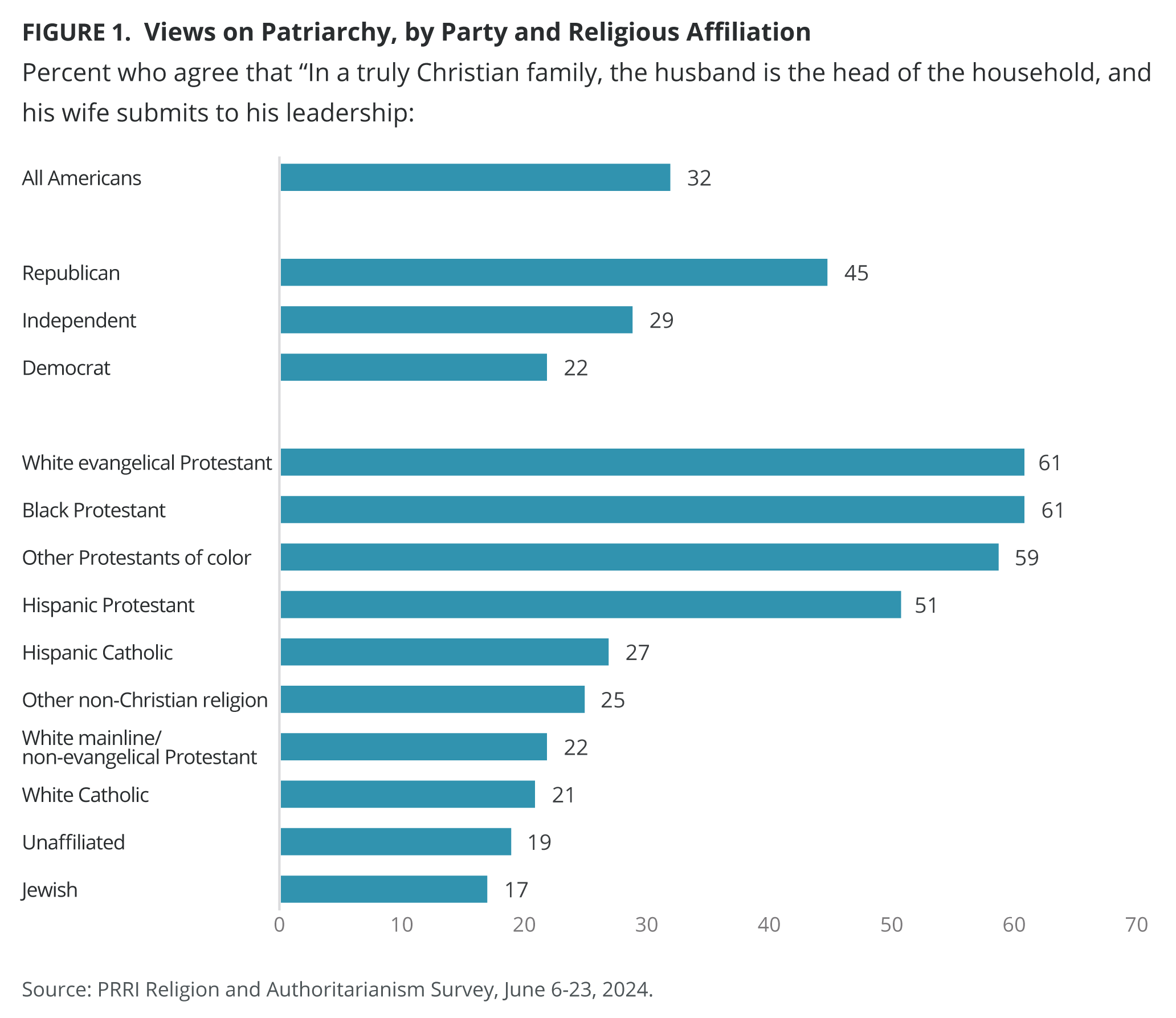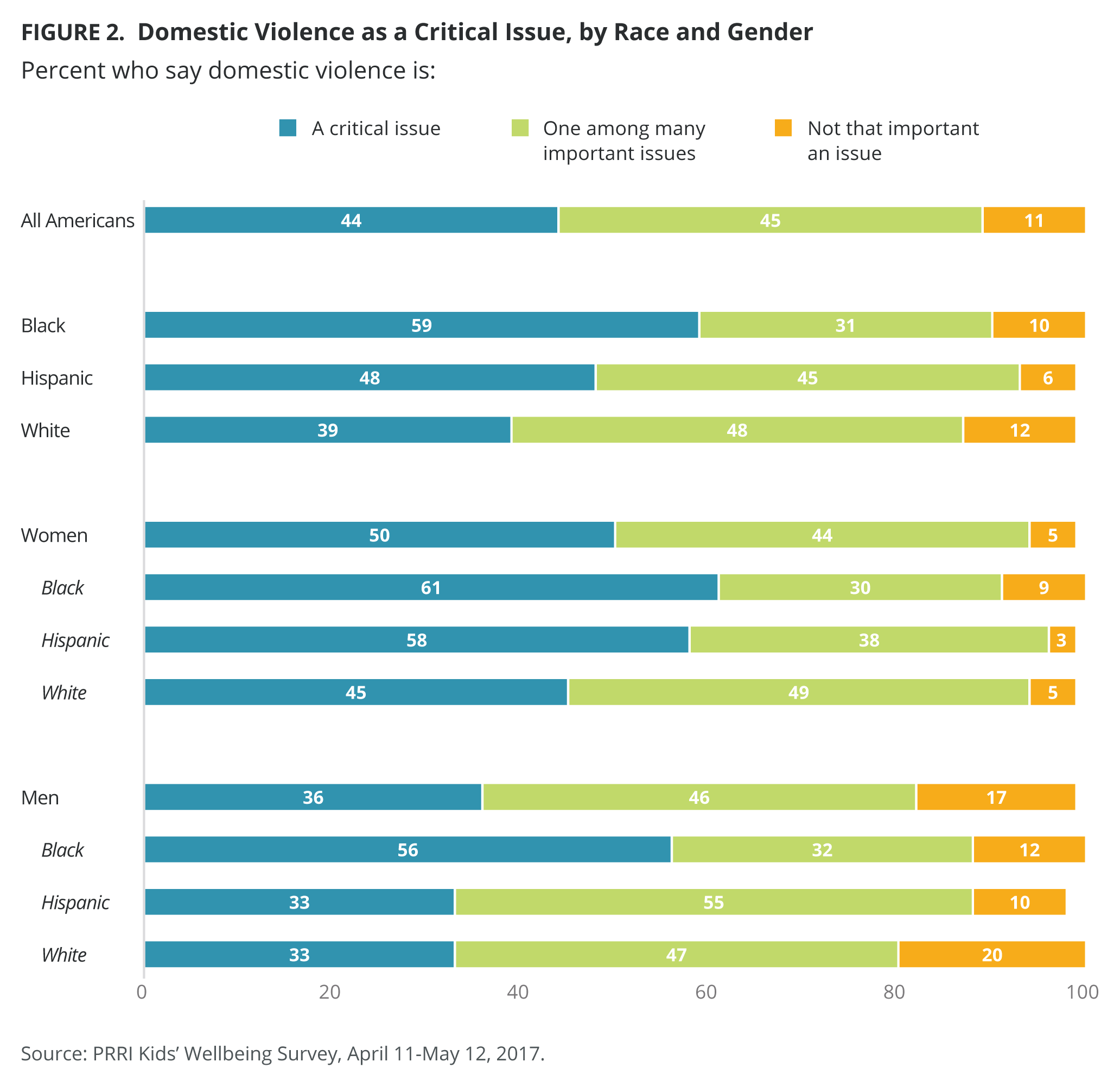Dr. Dara Coleby Delgado is the Bishop James Mills Thoburn Chair of Religious Studies, an Assistant Professor of History and Religious Studies, an affiliate faculty in Black Studies and Women, Gender, and Sexuality Studies at Allegheny College and a 2024-2025 PRRI Public Fellow.
On September 12, 2024, Attorney General Merrick B. Garland, on behalf of the Department of Justice (DOJ), announced plans to invest $690 million in grant funding for survivors of domestic violence. According to the DOJ website, the funding “will support services and justice responses for victims and survivors of domestic violence, dating violence, sexual assault, and stalking across all U.S. states and territories and in many Tribal nations.” The grant commemorates the 30th anniversary of the Violence Against Women Act (VAWA), the first comprehensive federal law focused on preventing gender-based violence (GBV).
This investment comes not long after video of a 2021 interview with JD Vance surfaced that included a controversial statement from Vance about reversing no-fault divorce, even in cases involving violence.[1] The interview emerged over the summer when many Americans became aware of the “Mandate for Leadership: The Conservative Promise” — more commonly known as Project 2025 — the conservative policy manual spearheaded by the Heritage Foundation. Although Project 2025 does not reference fault or no-fault divorce, several of its advisors and authors share the vice-president-elect’s sentiments. This Spotlight examines the role of conservative Christianity in justifying patriarchal views and gender-based violence, and Americans’ overall views on these topics.
Family Over Everything: Patriarchal Systems of Dominance and Power
Project 2025, a contemporary Western project with deep entanglements in American Christianity’s obsession with nationalism, prosperity, and happiness, defines the traditional nuclear family as “a father, mother, and their children.” Because the nuclear family lives in our collective imagination “as good,” it is socially understood as a protected class and thus inscribed with a sacred trust to hold our collective understanding about happiness, safety, and fidelity.
Gender-based violence, however, is not only a Western phenomenon or a contemporary reality. It is global and stretches across time. Among conservative Christians, GBV is safeguarded by misinterpretations of the Bible that expand ideas like those articulated in the New Testament’s “Household Codes” to warrant abuse. Although these passages do not refer to the modern-day nuclear family, particular branches of conservative Christianity use them to justify patriarchal systems of dominance and power. Even more, they use them to force survivors to forgive their abusers and remain silent about what they have endured.
Through misrepresented ideas around submission and male headship like those found in Ephesians 5:22-24, women are burdened with the expense of forgiving their husbands “no matter what his shortcomings are” and maintaining the image of a happy whole family.
A recent PRRI survey shows that one-third of Americans (32%) agree with the statement “In a truly Christian family, the husband is the head of the household, and his wife submits to his leadership.” Republicans are twice as likely as Democrats to agree with this statement (45% vs. 22%), compared with 29% of independents. Moreover, most white evangelical Protestants (61%), Black Protestants (61%), other Protestants of color (59%), and about half of Hispanic Protestants (51%) agree with this statement. In comparison, just one in four Hispanic Catholics (27%), other non-Christians (25%), and about two in ten white mainline/non-evangelical Protestant (22%), white Catholic (21%), religiously unaffiliated (19%), and Jewish (17%) Americans agree.

In the U.S., the nuclear family is a powerful political tool. Or, as punctuated by the authors of Project 2025, “the foundation for a well-ordered nation and a healthy society.” Because the traditional nuclear family exists in the U.S. as a proverbial polis minor on which the health, welfare, and future of the nation-state rests, it is no wonder that Vance and many of the architects of Project 2025 are so deeply invested in policies like no-fault divorce, even in situations involving domestic violence. The messaging from those affiliated with the so-called “Party of Life” and its claims about traditional family values is clear: women are expendable, but our shared myth of American exceptionalism is not.
The Gender Gap: American Attitudes About Gender-Based Violence
In 2017, PRRI published Attitudes on Child and Family Wellbeing: National and Southeast/Southwest Perspectives. This survey yielded important insights into Americans’ social affinities and cultural anxieties about race, poverty, and welfare. Concerning domestic violence, a subcategory of GBV, the survey found that 44% of those polled viewed domestic violence as a high-priority issue or community problem. Data from the same survey revealed a gender gap in concerns about domestic violence among racial and ethnic lines. Women were significantly more likely than men to say that domestic violence was a critical issue (50% vs. 36%). Similarly, the majority of Black Americans (49%) said that domestic violence is a critical issue to them, compared with about half of Hispanic Americans (48%) and only 39% of white Americans. Zooming in further, the majority of Black women (61%) and Hispanic women (58%) said domestic violence was a critical issue to them, compared with only 45% of white women. Although a slim majority of Black men (56%) said “domestic violence is a serious issue,” this was less true for their Hispanic (33%) and white counterparts (33%).[2]

Seven years since that survey, the disproportionate impact of GBV on women-identified persons remains, making this a women and gender justice issue. Unfortunately, because social apathy embeds GBV under the larger umbrella of violent crimes, it is not lifted up as a high-priority issue or community problem of personal/interpersonal consequence. Nevertheless, because of the political, religious, and racial implications of GBV, it is a societal issue that demands collective involvement.
Given the current political discourse surrounding GBV, it is important to note that more than eight in ten white evangelicals voted for former President Donald Trump. It’s likely many did so claiming that the Republican nominees represent their biblical values. We would do well to interrogate that claim and consider the threat such values pose to women and girls.
[1] Since the publicity around his statements, Vice President-elect Vance has accused the media of twisting his words. In truth, during that interview, he used inclusive language and, thus, did not expressly say that women should remain in violent marriages with abusive men. However convoluted, his messaging was articulating a right-wing, religiously conservative view of marriage and family. A view that disproportionately favors men and restricts family to a heteronormative definition.
[2] When examining the question by education among white Americans, white Americans with a high school degree or less were about twice as likely as those with a four-year college degree to say domestic violence is a critical issue to them personally (51% vs. 27%)




